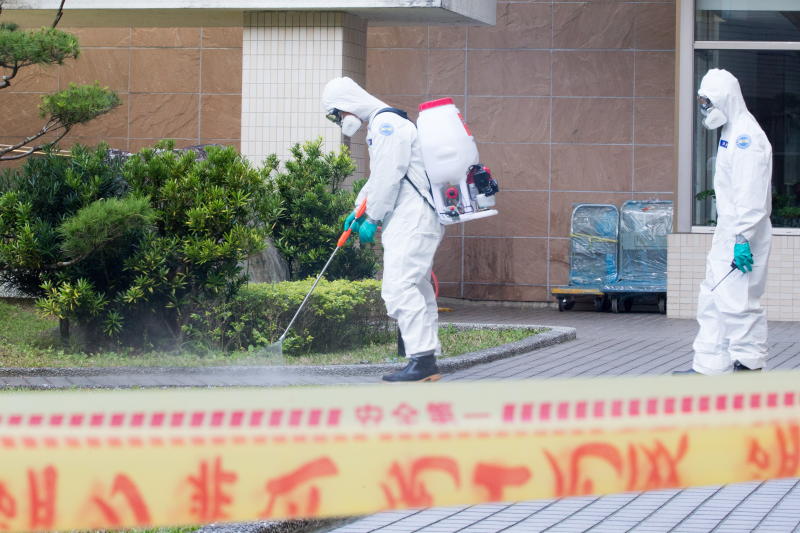Coronavirus: Taiwan to pass Bill to lessen impact of outbreak
Sign up now: Get insights on Asia's fast-moving developments

Taiwanese military from the 33rd Chemical Group 6th Army Corps personnel sanitizing the Wuhan evacuees quarantine facility, at an undisclosed location in Taiwan, on Feb 19, 2020.
PHOTO: EPA-EFE
Katherine Wei
Follow topic:
TAIPEI - Taiwan is scheduled to pass a Bill drafted to deal with the coronavirus outbreak, with a budget of NT$60 billion (S$2.78 billion) appointed to help sectors hit by the outbreak and medical personnel involved in the fight against the epidemic, said Premier Su Tseng-chang on Wednesday (Feb 19).
The draft Bill's announcement comes with the news of Taiwan's second confirmed coronavirus patient with unknown infection origins, a woman who has not travelled overseas for two years.
The Bill has been sent to the legislature to be voted on, and once passed, will be implemented until at least the end of June 2021.
It proposes compensation for those who have been quarantined because of Covid-19, as well as medical personnel whose work helped contain the spread of the disease.
Companies that granted their employees "coronavirus prevention leave" will pay less enterprise income taxes, and employees taking days off for virus prevention will not be seen as playing hooky, said the Cabinet.
The plan will be mainly financed by tax surpluses from the past few years.
"I hope the ruling party and the opposition parties can work together in supporting this Bill," said President Tsai Ing-wen on Wednesday after the draft was approved by the Cabinet.
The Bill will also include increased penalties for people spreading false information about the virus - up to three years behind bars or fines of up to NT$3 million.
For those who are supposed to be quarantined but leaving quarantine centres or breaking at-home quarantine without permission, the fines will be from NT$100,000 to NT$1 million.
The government's plan to beef up quarantine regulations is the latest in Taiwan's slew of measures aimed at containing the spread of the coronavirus, notwithstanding challenges that came with the lack of a World Health Organization (WHO) membership.
Taiwan reported its first coronavirus death last week. As of Thursday (Feb 20), it has 24 confirmed cases, with two discharged from the hospital and another two preparing to be discharged.
For an area that is in constant contact with mainland China, Taiwan's numbers in this epidemic have been on the lower side, compared to Japan's 700-plus, South Korea's 82, Singapore's 84 and Thailand's 35.
According to official statistics, there were about 404,000 Taiwanese people working in China in 2018, many of whom travel frequently to and from China.
While Ms Tsai and her administration have called for China and WHO to put virus prevention and medical needs before political differences, Taiwan is still excluded from the organisation because China considers Taiwan a wayward province, not entitled to the status of a state.
Taiwan's medical experts were initially concerned that Taiwan would become a loophole in the world's epidemic prevention efforts as it would not be receiving relevant updates as soon as other WHO members.
"There's no reason that Taiwan should be excluded from the WHO," said Taipei Mayor and former physician Ko Wen-je on Jan 22, a day after Taiwan reported its first confirmed coronavirus case.
Mr Ko's opinion was echoed by Ms Tsai, Taiwan's Ministry of Foreign Affairs and other top ranking officials in the past few weeks, which did little but grant Taiwan the role of sideline participator in last Wednesday's WHO meeting about the coronavirus.
But this is not Taiwan's first rodeo when it comes to a spiralling epidemic, and being left out of the loop.
With the experience of battling SARS and getting rejected from joining the WHO then, Taiwan's government and medical experts have been preparing the country for the worst. On Jan 12, Taiwan confirmed that it would be sending epidemic experts to Wuhan to find out more about the coronavirus, and pledged to keep its citizens informed of all new discoveries related to the virus.
The Central Epidemic Command Center (CECC) has been holding press conferences almost every day, and working closely with the Executive Yuan - or Cabinet - to prioritise medical resources for Taiwanese.
This started with Mr Su's Jan 23 announcement limiting the sale of face mask to prevent people from hoarding, while non-citizen children of Taiwanese with mainland Chinese spouses have been temporarily banned from entering the island for its healthcare.
Taiwan's National Healthcare System grants universal healthcare to all Taiwanese people with a healthcare ID card.
Each Taiwanese' medical records are stored in his healthcare ID card and in the healthcare information system. The card is now a key component in Taiwan's attempts to distribute medical resources evenly, as pharmacies selling government-distributed face masks can see who has purchased the allotted amount of masks each week.
"By using the healthcare information system, pharmacies can keep track of the mask purchases and prevent the prices from skyrocketing, also instructing people on how and when face masks should be worn," said Taiwan Young Pharmacists Group head Lee Yi-hsuan on Wednesday.
"I think the CECC has been doing a good job, there's no flaw so far," said Mr Ko in a press conference on Tuesday.
Taiwan also saw its first group of 246 evacuees from Wuhan released from quarantine on Tuesday, with one confirmed case from the group still in the hospital. The government is still working out how to evacuate the remaining Taiwanese stranded in Wuhan.

